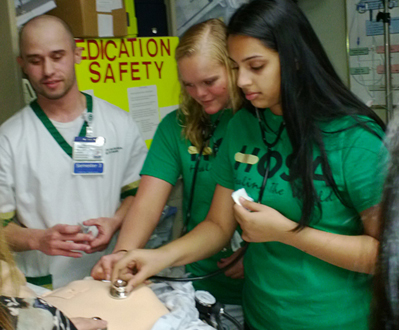SimLEARN staff demonstrate simulation skills to students
By Gerald Sonnenberg
EES Marketing and Communication

Dr. Malcolm Klein, chief of anesthesiology at the James A. Haley VA Hospital in Tampa, Fla., helps a local student intubate a "patient" at the symposium. (VA photo by Dolly Glass)
ORLANDO, Fla. – SimLEARN staff provided medical simulation demonstrations to more than 400 high school and middle school students from throughout Florida Sept. 30 at the Lou Frey Institute of Politics and Government on the University of Central Florida. The "Simulation: Evolutionary Past, Boundless Future" event demonstrated careers in science, technology, engineering and mathematics (STEM) in an effort to show students that STEM careers branch out far beyond what they might imagine.
SimLEARN was one of about a dozen organizations that demonstrated a variety of modeling and simulation techniques and helped provide a hands-on, interactive simulation symposium. These demonstrations allowed students to "practice" procedures.
Dr. Haru Okuda, SimLEARN national medical director, was part of the team that participated in the symposium, and he enjoyed the opportunity to share the hands-on opportunity with young, eager students.
"It was very exciting to have the opportunity to interact with this group of interested high school and middle school students," he said. "They all got the ‘hands-on’ experience for using various, state-of-the-art, modeling and simulation–based clinical training tools used within Veterans Health Administration for improving workforce skills in providing health care to our Veteran patients. They eagerly participated in drills for difficult airway intubations, central line placements, as well as resuscitation and high-fidelity mannequin operations."
Harry Robinson, SimLEARN national program manager, said, "the Lou Frey Institute, University of Central Florida, and supporting partners provided a well-organized and executed event that captivated over 430 students from over 13 area high schools. The SimLEARN faculty and staff were grateful for the opportunity to join the team in showcasing several simulation-based training modalities that are fundamentally changing and improving clinical health care training."
"The medical domain is quickly moving over the precipice to increase training efficiency through simulation, while maintaining the high standards historically achieved through on-the-job training," he added. Our student attendees certainly seemed enthused and enjoyed the chance to learn more about their future prospects in STEM."



















